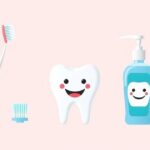As we embrace our 30s, we often face unique challenges, including maintaining women’s teeth health. With hormonal changes and busy lifestyles, a healthy smile can sometimes take a backseat. But what if we told you that certain vitamins can boost not only your teeth health but your confidence too? In this article, we’ll explore the best vitamins that can help rejuvenate your dental well-being and keep your smile radiant!
Understanding Women’s Dental Health Needs After 30
As women reach their 30s, their bodies go through many changes. These changes can affect dental health significantly. Hormonal fluctuations, often linked to menstruation, pregnancy, and menopause, can influence everything from gum health to saliva production. Women might experience conditions like dry mouth or increased gum sensitivity, making it even more essential to pay attention to oral care.
In this decade, it’s common for women to juggle various responsibilities—be it career, family, or personal health. Amidst this whirlwind, dental health can sometimes take a backseat. However, prioritizing it can not only enhance your smile but also boost your overall confidence. Addressing specific nutritional needs becomes crucial at this stage to maintain strong teeth and healthy gums.
The Role of Calcium in Teeth Strength
Calcium is often hailed as the mineral for strong bones, but it holds equal importance in maintaining teeth health. Our teeth are primarily made of a mineral called hydroxyapatite, which needs sufficient calcium to stay strong and resilient against decay. After age 30, women’s calcium needs increase to combat natural bone density loss during aging.
Incorporating calcium-rich foods like yogurt, leafy greens, and almonds into your diet can significantly contribute to robust teeth. If dietary sources seem insufficient, calcium supplements may also be beneficial. Just be sure to consult your healthcare provider before starting any supplement regimen.
Vitamin D: The Sunshine Vitamin for Strong Teeth
Vitamin D is often referred to as the sunshine vitamin because your body produces it upon exposure to sunlight. This vitamin plays a vital role in calcium absorption. Without Vitamin D, your teeth won’t have the calcium they need to remain strong and healthy.
Women over 30 often find it challenging to get adequate Vitamin D, especially during winter months or for those who spend most of their time indoors. Incorporating foods like fatty fish, eggs, and fortified dairy products into your meals can help. You might also consider taking Vitamin D supplements if your levels are particularly low. Regular blood tests can guide you on how much you may need.
Why Vitamin C is Crucial for Gum Health
Vitamin C is not just for boosting your immune system; it is essential for maintaining gum health. This vital vitamin helps your body produce collagen, a key component in connective tissues, including your gums. A deficiency can lead to conditions like gingivitis, which may progress to more severe periodontal disease if ignored.
Eating plenty of fruits and vegetables rich in Vitamin C, such as oranges, strawberries, and bell peppers, can keep your gums healthy. You can also find vitamin C in supplement form, which can be a great boost, especially during times when stress may affect your nutrition.
The Benefits of Vitamin A for Overall Mouth Health
Vitamin A is another crucial nutrient that supports oral health. It plays a role in maintaining mucous membranes and soft tissues, helping to keep your mouth moist and free from infections. Additionally, Vitamin A promotes healthy saliva production, which is necessary for neutralizing acids and protecting against tooth decay.
You can obtain Vitamin A from foods like sweet potatoes, carrots, and leafy greens. If you’re not getting enough from your diet, consider looking into multivitamins that contain Vitamin A, but be cautious about exceeding recommended doses.
B Vitamins: The Hidden Heroes for Oral Wellness
B vitamins are often overlooked, yet they offer incredible benefits for oral health. They help red blood cells function, giving your body the energy it needs, especially critical for women experiencing fatigue. Vitamin B12, in particular, supports healthy nerve function, contributing to the overall health of your mouth.
Foods rich in B vitamins, such as whole grains, eggs, and leafy greens, should be staples in your diet. If you struggle to get enough from food alone, consult with a healthcare provider about adding a B-complex vitamin to your routine.
Omega-3 Fatty Acids and Their Impact on Teeth
Omega-3 fatty acids might sound like a buzzword, but they are immensely beneficial for your dental health. These healthy fats are known for their anti-inflammatory properties, which can help reduce gum inflammation and promote better gum health overall. Studies suggest that incorporating Omega-3s into your diet can lower the risk of periodontal disease.
Fatty fish like salmon and sardines, walnuts, and flaxseeds are excellent sources of Omega-3 fatty acids. You might also want to consider fish oil supplements, especially if you’re not a fan of fish. Again, always check with your healthcare provider before starting any new supplement.
How to Incorporate Vitamins into Your Daily Routine
Incorporating these essential vitamins into your daily routine doesn’t have to be tricky or overwhelming. Here are some tips to get started:
- Meal Planning: Plan your weekly meals to include a variety of vitamin-rich foods. This can be a fun way to experiment with new recipes!
- Snack Wisely: Keep healthy snacks on hand, like yogurt or fresh fruits, to keep you fueled throughout the day.
- Simplify with Supplements: If you find it difficult to get enough vitamins, consider multivitamins or specific supplements.
- Set Reminders: Use phone alarms to remind you to take your vitamins or health supplements, so you don’t forget.
- Hydration Matters: Drink plenty of water; it helps your body absorb nutrients and keeps your mouth hydrated.
The Importance of Regular Dental Check-ups
No matter how many vitamins you take or how well you eat, regular visits to the dentist are essential for maintaining oral health. Dentists can spot potential issues before they become serious, ensuring your smile stays bright and healthy. Aim for check-ups at least twice a year, and don’t hesitate to seek care sooner if you notice changes in your dental health or experience discomfort.
During these appointments, share any health changes or symptoms you’re experiencing. Understanding your overall health can give your dentist invaluable insights into your dental care needs.
Embracing a Holistic Approach to Dental Care
Taking care of your teeth and gums involves more than just diet and dental visits. Embracing a holistic approach to dental health means considering your overall well-being. Stress management, proper sleep, and regular exercise can greatly improve your dental health as well.
Stress, for instance, can lead to teeth grinding and jaw clenching, affecting your oral health significantly. Finding ways to relax through yoga, meditation, or even engaging in hobbies can contribute positively to your dental care.
By making small, consistent changes to your lifestyle, you can dramatically improve your teeth health after 30. Just remember, you’re not alone in this journey! Many women are facing similar challenges, but by following a simple step-by-step method, you too can enhance your confidence and smile. Discover the solutions that work for you, and embrace the transformation ahead!






